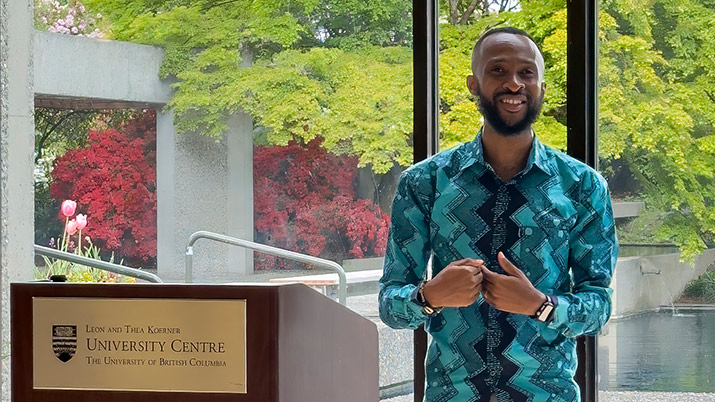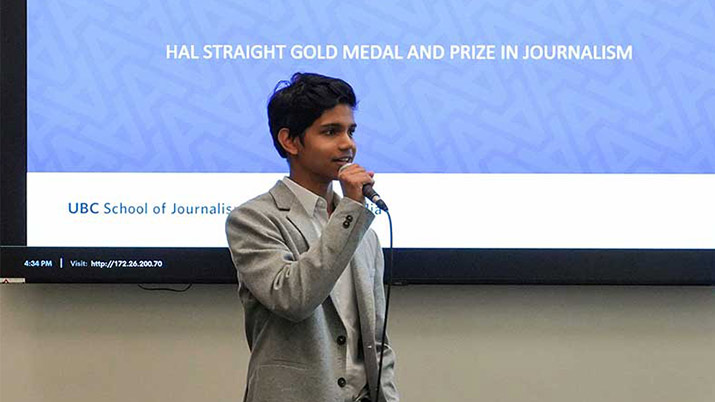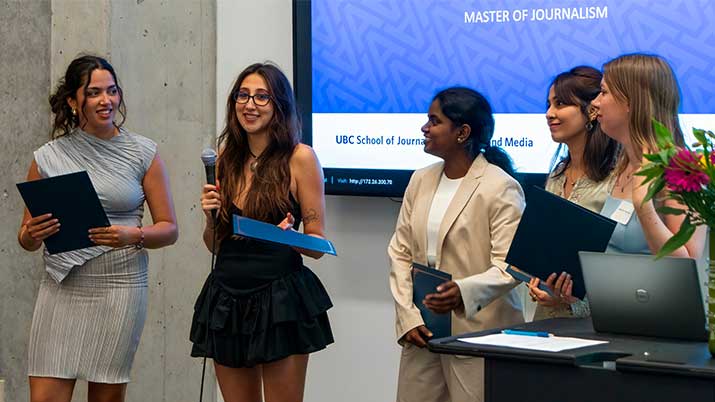Yukta Bhandari recently finished her B.A. in Psychology with a Minor in Writing and Communication (WRDS).
Fresh off the heels of presenting at the prestigious CASDW/ACR (Canadian Association for the Study of Discourse and Writing/ Association Canadienne de Rédactologie) conference, Yukta is now gearing up for a M.A. in Psychology at New York University.
We caught up with Yukta to learn more about her project and how the WRDS Minor in Writing and Communication transformed her as a researcher and gave her skills to succeed in both the academic and professional worlds.


Yukta Bhandari, WRDS Minor in Writing & Communication
Congratulations on your graduation and the recent conference presentation. Tell us briefly about your project.
My project critically examined how accessibility is being framed in higher education policy across British Columbia. While the Accessible BC Act requires institutions to remove and prevent barriers, I was interested in whether these efforts go beyond compliance to truly challenge systemic ableism. I analyzed accessibility plans from 16 post-secondary institutions using Disability Justice as a guiding framework, and through a mix of Critical Discourse Analysis and thematic coding I found that while institutions are making progress in technical accessibility, many policies still stop short of imagining more transformative, justice-oriented approaches.
My project calls for a shift in how we think about access: not as a checkbox or a set of accommodations, but as an ongoing, relational, and community-driven process that centres disabled voices.
How was your experience presenting at the prestigious conference?
Presenting this work at CASDW/ACR was especially meaningful because the conference values both critical inquiry and inclusive scholarship—it was the perfect space to share research that’s both academic and deeply personal. It was truly one of the highlights of my undergraduate experience! I had the chance to engage in thoughtful, affirming conversations and form connections that I’ll carry with me into the next stages of my academic journey. I left feeling both energized and grounded.
How have the WRDS courses helped you?
I took every WRDS course that was available during my time in the program, and there are several more being offered next year that I wish I could take! WRDS courses didn’t just shape how I write; they fundamentally transformed how I think as a researcher. Early on, I developed a strong foundation in understanding genre and disciplinary discourse. Later, I had the opportunity to refine a research project that eventually became my conference paper, and my capstone project helped me engage more deeply with the ethics and politics of knowledge production, especially around questions of citation, authorship, and whose voices are recognized in academic spaces.
More than anything, WRDS taught me to treat writing as a method of inquiry. I no longer see it as just a way to communicate conclusions, but as a space where questions evolve, thinking unfolds, and meaning gets made. That shift has influenced every academic project I’ve taken on since, and I’ll carry it into graduate school and beyond.
“More than anything, WRDS taught me to treat writing as a method of inquiry. I no longer see it as just a way to communicate conclusions, but as a space where questions evolve, thinking unfolds, and meaning gets made.”
Why did you enrol in the Minor? How has the Minor Program prepared you for your graduate studies?
I enrolled in the Minor because I wanted to deepen my understanding of writing, not just as a tool for communication, but as both a method and an object of inquiry. I also wanted to learn how to communicate research more clearly, ethically, and effectively across disciplines. The program’s interdisciplinary approach and its emphasis on student-led research immediately stood out to me.
The faculty and staff have been, quite honestly, some of the best people I’ve worked with; they are thoughtful, supportive, and always willing to engage deeply with student work. They offered rigorous feedback while giving me the freedom to ask unconventional questions and explore complex ideas. Through the program, I’ve learned how to design and conduct research in ways that are rhetorically effective, critically reflective, and rooted in care, skills that I know will be essential not just in graduate school but in every academic and professional space I move through.
“I enrolled in the Minor because I wanted to deepen my understanding of writing, not just as a tool for communication, but as both a method and an object of inquiry. I also wanted to learn how to communicate research more clearly, ethically, and effectively across disciplines.”
What has been your biggest takeaway from the WRDS Minor Program?
Writing is research, writing is human, and writing is dynamic; it’s not just a tool for reporting findings but a space where analysis happens, questions take shape, and uncertainty is welcomed rather than avoided. The Minor taught me to see writing not as a polished end product, but as an evolving, iterative process that mirrors the messy, beautiful work of thinking itself. Learning to embrace messiness and to sit with complexity instead of rushing to clarity was a transformative shift for me. It changed not only how I approach academic projects but also how I think, create, and relate to ideas more broadly.


